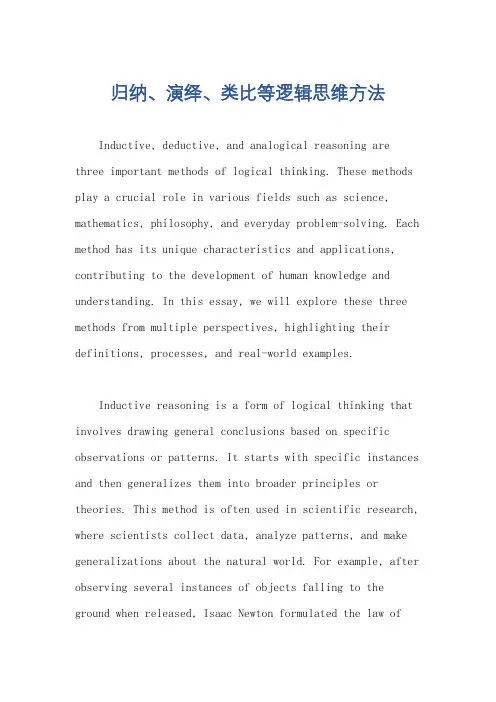归纳总结法Inductive-GeneralizationPPT课件
- 格式:pptx
- 大小:3.27 MB
- 文档页数:12



![归纳推理PPT讲稿思维导图知识点归纳总结[PPT白板课件]](https://uimg.taocdn.com/ea8ebe7af01dc281e53af086.webp)


归纳、演绎、类比等逻辑思维方法Inductive, deductive, and analogical reasoning are three important methods of logical thinking. These methods play a crucial role in various fields such as science, mathematics, philosophy, and everyday problem-solving. Each method has its unique characteristics and applications, contributing to the development of human knowledge and understanding. In this essay, we will explore these three methods from multiple perspectives, highlighting their definitions, processes, and real-world examples.Inductive reasoning is a form of logical thinking that involves drawing general conclusions based on specific observations or patterns. It starts with specific instances and then generalizes them into broader principles or theories. This method is often used in scientific research, where scientists collect data, analyze patterns, and make generalizations about the natural world. For example, after observing several instances of objects falling to the ground when released, Isaac Newton formulated the law ofuniversal gravitation, which states that every object in the universe attracts every other object with a force proportional to their masses and inversely proportional to the square of the distance between them.On the other hand, deductive reasoning is a logical thinking process that starts with general principles or theories and applies them to specific situations to draw specific conclusions. It involves reasoning from the general to the particular. Deductive reasoning is commonly used in mathematics and formal logic, where a set of axioms or premises are used to derive new statements or theorems. For instance, in geometry, the Pythagorean theorem is deduced from the axioms of Euclidean geometry. The theorem states that in a right-angled triangle, the square of the hypotenuse is equal to the sum of the squares of the other two sides.Analogical reasoning is a method of logical thinking that involves drawing conclusions by finding similarities between different situations or objects. It relies on the assumption that if two or more things are similar in somerespects, they are likely to be similar in other respects as well. Analogical reasoning is often used in problem-solving, decision-making, and creative thinking. For example, when faced with a new problem, one might try to find similarities with previously encountered problems and apply similar solutions. This method is also used in legal reasoning, where judges may consider previous cases as precedents to guide their decisions in similar cases.In addition to their definitions and applications, it is important to understand the processes involved in these methods of logical thinking. Inductive reasoning typically involves several steps, including observation, pattern recognition, hypothesis formation, and conclusion drawing. It requires careful data collection, analysis, and evaluation to ensure the validity of the generalization. Deductive reasoning, on the other hand, follows a more structured process. It starts with a set of premises or axioms, applies logical rules or principles, and derives specific conclusions. This process is often represented in the form of syllogisms or logical arguments. Analogical reasoning involves identifying similarities betweendifferent situations or objects, extracting relevant information, and applying it to the current problem or situation.To illustrate the practical relevance of these logical thinking methods, let's consider some real-world examples. In the field of medicine, doctors often use inductive reasoning to diagnose patients. They collect specific symptoms and observations, analyze patterns, and make generalizations about the underlying medical conditions. Deductive reasoning is employed in computer programming, where programmers use predefined rules or algorithms to solve specific problems. They start with general programming principles and apply them to write code for specific tasks. Analogical reasoning is commonly used in marketing and advertising. Marketers often draw on successful campaigns from the past and apply similar strategies to promote new products or services.In conclusion, inductive, deductive, and analogical reasoning are three important methods of logical thinking that have diverse applications in various fields. Inductivereasoning involves generalizing from specific observations, deductive reasoning applies general principles to specific situations, and analogical reasoning draws conclusions by finding similarities between different situations. Understanding the processes and examples of these methods can enhance problem-solving, decision-making, and creative thinking abilities. These methods are essential tools for advancing human knowledge and understanding the complexities of the world we live in.。



![归纳与演绎PPT讲稿思维导图知识点归纳总结[PPT白板课件]](https://uimg.taocdn.com/2240460c0722192e4536f686.webp)
